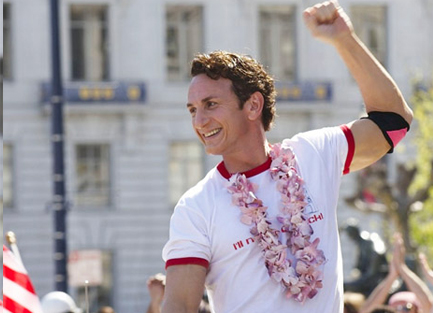 For a film clearly cradled in the sad, poignant context of Harvey Milk’s fate, beginning with grainy file footage of police persecution and the actual moment of Dianne Feinstein announcing an assassination, “Milk” is a joyous remembrance. Far removed from the vibe of his recent obtuse efforts, Gus Van Sant has made a distinctly human work which by the closing credits is a potpourri of the inspiring, moving, tender, riotously funny and genuinely heartwarming.
For a film clearly cradled in the sad, poignant context of Harvey Milk’s fate, beginning with grainy file footage of police persecution and the actual moment of Dianne Feinstein announcing an assassination, “Milk” is a joyous remembrance. Far removed from the vibe of his recent obtuse efforts, Gus Van Sant has made a distinctly human work which by the closing credits is a potpourri of the inspiring, moving, tender, riotously funny and genuinely heartwarming.
The downfall of the biopic is that so often the hero is placed on a pedestal or damned by a fatal flaw, or commonly both. But Harvey Milk just seemed to be a galvanizing dude who liked dudes and who wanted to envelope the political and social worlds with fundamental human rights. He may have been the self-anointed “Mayor of Castro Street” but he was no rock star. A small business owner of a modest camera shop, Milk bonded with people in a quotidian way, banding together the people of his San Francisco community – the elderly, union laborers, business owners and even the hustlers, amongst others — into a coalition of the distinct, unifying their separate vulnerability into a progressive collective. Politically ardent but not interested in political machinations, he was motivating on a common level, with an eye-to-eye connection, as he became a perpetual candidate in local campaigns.
Sean Penn is a marvel in the title role as he constructs a characterization which isn’t mimicry or pantomime but the wonderful embodiment of a gifted and genuine man who was a bit of a square, the kind of guy who had Sylvester perform at his birthday party but didn’t actually dance. Penn creases his face regularly with a wide, infectious grin as he plays Harvey as the consummate people person. There’s not a dab of the method actor in his performance. He portrays Milk as heartfelt, bullhorn in hand, awkwardly thrusting his fist to the sky, exhorting crowds but not prone to soliloquies; instead his calls for action were impassioned yet swift. A scene with his huddled campaign cohorts where Milk advocates everyone coming out and living as openly gay folks doesn’t seem as much like an earnest clarion call as it does a matter-of-fact belief. It’s simply the thing to do. Later, after his election as a city supervisor, when Harvey debates an arch conservative in a contentious venue, the succinct simplicity of his arguments and the unveiling of his opponent’s contradictions are demonstrated in a clever but understated manner. The story and script by Dustin Lance Black highlight this quality of the empowering everyman. Whereas films centered on politics can be, if not careful, ponderous or self important, Van Sant makes sure to show that joining up on a Milk campaign was exhilarating and fun. All work and no flirt would have made Harvey and his buddies very dull boys.
The film incorporates an astute storytelling device which discards the voiceover or contemporaries’ recollections by having Milk speak into a microphone at his kitchen table in his modest, unadorned apartment. As he sits in his nondescript chair, tape recording autobiographical events, Penn’s delivery helps emphasize his sincere, authentic, and vulnerable qualities.
The supporting cast is instilled with stellar performances. They infuse the campaign rooms with camaraderie. But a few roles are worthy of particular praise. An almost unrecognizable Emile Hirsch plays the plucky Cleve Jones, a quick-study political neophyte. James Franco, who is graced with leading man looks but a character actor’s quirk, is warm and engaging as Scott Smith, the most important love of Harvey’s life. Diego Luna enters the story with a flourish in the later reels as Milk’s final paramour, Jack Lira. He also secures himself first dibs from casting directors in The Father Guido Sarducci Story.
Van Sant has created a film which is more than evocative of the 1970s. There’s a seamless quality to the interspersing between the archival film and the fictional account utilized throughout the movie. Cinematographer Harris Savides adopts a terrific muted retro look which is a similar visual style to the one he used so successfully in “Zodiac.” The art direction from Charley Beal and set decoration by Barbara Munch are sterling, costume designer Danny Glicker expertly drapes the cast in authentic garb, and the hair and makeup departments of Steven E. Anderson and Michael White have done exemplary work.
So 1978 seems like 2008 and, even, like tomorrow. As we snigger, almost aghast, at the shameless bigotry of the actual Anita Bryant from footage supporting a California proposition to fire gay and lesbian teachers, we realize that in the intervening thirty years society isn’t yet that far removed from her beliefs as votes denying consenting gays and lesbians the right to enter into civil marriage sadly abound. But “Milk” isn’t concentrated on the sour orange juice shills. The legacy of Harvey Milk is that a regular guy ardently speaking sensible, meaningful truths is pertinent, heartening, and rousing. This is one righteous and upbeat elegy which could be fittingly titled “You Make Me Feel (Mighty Real).”
